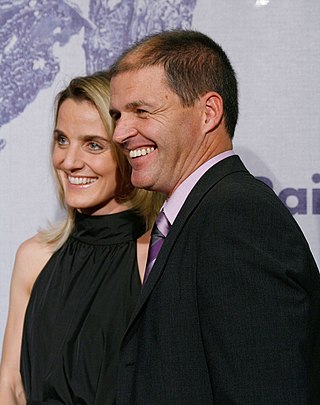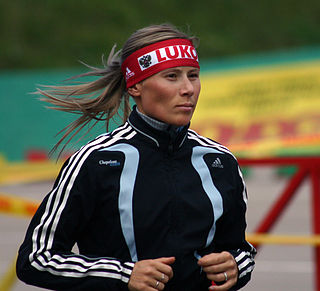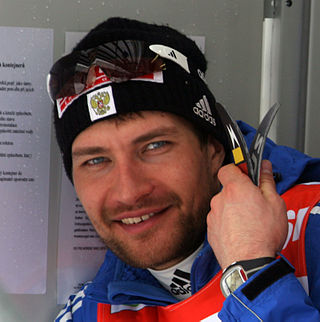
Austria competed at the 2006 Winter Olympics in Turin, Italy.

Markus Gandler is an Austrian former cross-country skier who competed from the late 1980s to the late 1990s.
Walter Mayer is an Austrian Cross-country skier and coach. He won the Vasaloppet in 1980, and finished second in 1992. As a coach, he was banned from the 2006 and 2010 Olympics after blood transfusion equipment was found in a house used by Austrian skiers during the 2002 Winter Olympics in Salt Lake City, Utah. Mayer was accused of blood doping violations and the International Olympic Committee (IOC) announced the ban after a three-month investigation.

Yulia Anatolyevna Chepalova is a former Russian cross-country skier.

Alyona Viktorovna Sidko is a Russian cross-country skier who competed between 2000 and 2013.
Silvio Fauner is an Italian former cross-country skier who competed from 1988 to 2006. His best known victory was part of the 4 × 10 km relay team that upset Norway at the 1994 Winter Olympics in Lillehammer. He also won four other medals at the Winter Olympics with silvers in the 4 × 10 km relay and bronzes in the 15 km (1994) and 30 km (1998).

Christian Hoffmann is an Austrian former cross-country skier who began competing in 1994. He won the bronze medal in the 50 km at the 1998 Winter Olympics in Nagano. Four years later at the 2002 Winter Olympics in Salt Lake City, Hoffmann finished second in the 30 km freestyle mass start event to Spain's Johann Mühlegg, but was awarded the gold medal in 2004 upon Mühlegg's blood-doping disqualification of darbepoetin.

The FIS Nordic World Ski Championships 2001 took place February 15–25, 2001 in Lahti, Finland for a record sixth time, previous events being held in 1926, 1938, 1958, 1978 and 1989. These championships also saw the most event changes since the 1950s with the 5 km women and 10 km men's events being discontinued, the 10 km women and 15 km men's events return to their normal status for the first time since the 1991 championships, the debut of a combined pursuit as a separate category, the addition of the individual sprint race for both genders, and the debut of the ski jumping team normal hill event. Extremely cold weather cancelled the women's 30 km event. The biggest controversy occurred when a doping scandal hit the host nation of Finland, resulting in six disqualifications. This would serve as a prelude to further doping cases in cross country skiing at the Winter Olympics in Salt Lake City the following year.
Kaisa Varis is a Finnish retired cross-country skier and biathlete. Her career has been marred by doping convictions: as a cross-country skier, she was involved but not suspended in a doping scandal and in 2003 she was suspended two years for doping use. After her suspension, she returned as a biathlete in 2007, but in 2008 she received a lifetime ban from all International Biathlon Union (IBU) competitions after another positive doping test. However, her lifetime ban was overturned in March 2009 because the Court of Arbitration for Sport ruled that the IBU failed to adhere to correct testing procedures; she remains eligible to compete in biathlon.

Natalya Konstantinovna Matveyeva is a Russian cross-country skier who has been competing since 2004. Matveyeva skis for Dynamo Moscow. She has a total of four victories since 2004, including three in the 2006–2007 season. All four of her victories have been in the sprint events.

Yevgeniya Anatolyevna Shapovalova is a Russian cross-country skier who has been competing since 2006.

Maxim Mikhailovich Vylegzhanin is a Russian former cross country skier and a three-time Olympic silver medalist at the 2014 Sochi Olympics in 50 km freestyle, 4 × 10 km relay and team sprint. He was stripped of his 2014 Olympic medals by the International Olympic Committee (IOC) on 9 November 2017, however on 1 February 2018, his results were restored as a result of the successful appeal.
Alfred Eder is an Austrian former biathlete.

Alexey Yevgenyevich Petukhov is a Russian cross-country skier who competed between 2002 and 2019.

Nikita Valeryevich Kryukov is a Russian former cross-country skier who competed internationally between 2006 and 2018. He was a sprint specialist who won an Olympic gold medal, three World Championship gold medals, six World cup gold medals, all in the sprint events. He was arguably the fastest skier ever when it came to double-poling on the flat in sprints. He generally favoured classic skiing and classic sprints over freestyle, but as he showed in winning the team sprint in the 2013 World Championship, in Val di Fiemme, he was also very strong in the freestyle sprint.

Tero Similä is a Finnish cross-country skier. He competed in cross-country skiing at the 2006 Winter Olympics in Turin, and placed tenth in the relay with the Finnish team.

Jürgen Pinter is an Austrian cross-country skier. He competed in cross-country skiing at the 2006 Winter Olympics in Turin. He participated at the FIS Nordic World Ski Championships 2011. In November 2008 he was handed a four-year ban from sports for doping.

Yuliya Anatoliyevna Ivanova is a Russian cross-country skier. She competed at the FIS Nordic World Ski Championships 2011 in Oslo, and at the FIS Nordic World Ski Championships 2013 in Val di Fiemme.

Evgeniy Nikolayevich Belov is a cross-country skier from Russia.

Competitive cross-country skiing encompasses a variety of race formats and course lengths. Rules of cross-country skiing are sanctioned by the International Ski Federation and by various national organizations. International competitions include the FIS Nordic World Ski Championships, the FIS Cross-Country World Cup, and at the Winter Olympic Games. Such races occur over homologated, groomed courses designed to support classic (in-track) and freestyle events, where the skiers may employ skate skiing. It also encompasses cross-country ski marathon events, sanctioned by the Worldloppet Ski Federation, and cross-country ski orienteering events, sanctioned by the International Orienteering Federation. Related forms of competition are biathlon, where competitors race on cross-country skis and stop to shoot at targets with rifles, and paralympic cross-country skiing that allows athletes with disabilities to compete at cross-country skiing with adaptive equipment.















